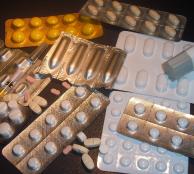
Many Muslims take medicines on a regular basis for long-term conditions such as diabetes and high blood pressure. Many more of us take some sort of medication on an ad-hoc basis. Whatever the case, should we, as Muslims, just accept all medicines to be Halâl and assume they are okay to take because the doctor prescribed them or the pharmacist recommended them?
Most of us take great care in ensuring we consume Halâl food. The same, however, cannot be said of medication. Many Muslims are not even aware of the fact that a lot of medicines in the market are not suitable for them to take. Others have a very lax attitude towards medication.
Medicines come in many different forms, the more common ones being tablets and capsules. There are certain ingredients that we need to look out for to avoid consuming Harâm. For example, most capsules are not suitable for Muslims to consume as they are made from gelatine. However, there are certain other capsules that are Halâl as they are made from vegetable sources. But these can only be obtained from certain manufacturers.
Those who are aware of the problem of taking capsules will either buy them or try to get the doctor to prescribe them alternatives, usually in the form of tablets. However, to assume that all tablets are Halâl is also a grave mistake as there is a possibility - albeit lesser than that of capsules - of the tablets being Harâm also. All tablets have extra ingredients called excipients [1] which are present for a variety of reasons. Some of these may be of animal origin but this can only be ascertained by contacting the manufacturer directly.
Another ingredient that we need to be aware of is ethanol, more commonly known as alcohol. This is found in many cough mixtures, making them unsuitable for Muslims to consume. Some children's syrups like paracetamol and ibuprofen may also contain ethanol. Not all 'alcohols' are Harâm, however. For example, some creams contain alcohol as one of their ingredients but could still be suitable for Muslims to use. This is because in the majority of cases this alcohol is not the intoxicating type and is normally produced chemically.
There are certain cases where it would be permissible to consume Harâm medicines. This would normally be for those people who have to take a certain type of medicine that is not available in a Halâl form and there is a chance that by not taking the medicine they could come to some harm or their health could deteriorate. In this situation it would be best to consult a reliable scholar or Mufti before consuming the medicine.
To summarise, here's the minimum you should do:-
- be aware of all the main Harâm ingredients and look out for these in your prescriptions
- ask your doctor to prescribe you medicines that are more likely to be Halâl (suitable for vegetarians and free from ethanol)
- ask the pharmacist to try to find out if the medicines you have been prescribed or are are looking to buy is Halâl
- failing the above, another option would be to find out yourself by contacting the manufacturer of the medicine directly and asking to speak to the medicines information department. This department will usually have all the information about each of their products and will be able to tell you whether there are any animal-derived ingredients or ethanol in the medicine. It is important to note that if the manufacturer labels a medicine as Halâl you need to check to make sure they use the correct criteria in declaring it as such
As a Muslim community, we should be looking at the example of the Vegetarian and Vegan societies who have campaigned for manufacturers of food and medicines to make animal-free products. We have also benefited from their work when buying food products as it makes it easier to confirm whether they are Halâl or not. If we work together as a community and request drug manufacturers to make Halâl medicines, I am sure that in the future, inshâ-Allâh, manufacturers will start producing Halâl products which will make it easier for the whole community.
It is difficult to make a Halâl and Harâm list of medicines because there are hundreds, if not thousands, of medicines out there in the market which come in so many different forms, and which are made by many different manufacturers. But, inshâ-Allâh, my plan - as a qualified Pharmacist (with scholarly guidance and approval) - is to start with a list of the most common medicines used by the vast majority of people and also respond to queries from readers, so hopefully over time we will have a bigger list which will benefit more Muslims.
[1] natural or synthetic substances formulated alongside the active ingredient of a medication
Category:

Add new comment